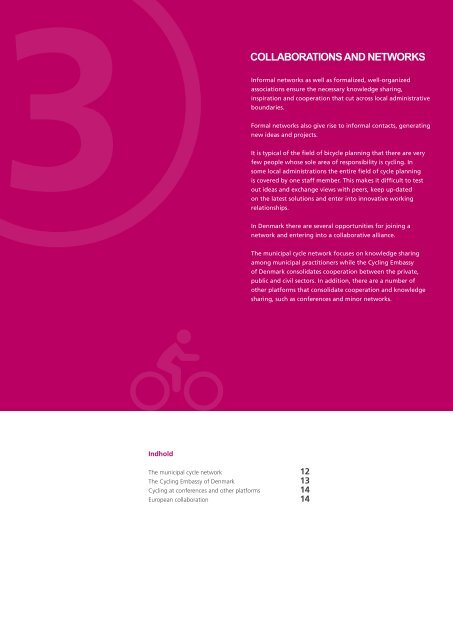Collection of Cycle Concepts 2012.pdf - Fietsberaad
Collection of Cycle Concepts 2012.pdf - Fietsberaad
Collection of Cycle Concepts 2012.pdf - Fietsberaad
Create successful ePaper yourself
Turn your PDF publications into a flip-book with our unique Google optimized e-Paper software.
3<br />
COLLABORATIONS AND NETWORKS<br />
Informal networks as well as formalized, well-organized<br />
associations ensure the necessary knowledge sharing,<br />
inspiration and cooperation that cut across local administrative<br />
boundaries.<br />
Formal networks also give rise to informal contacts, generating<br />
new ideas and projects.<br />
It is typical <strong>of</strong> the field <strong>of</strong> bicycle planning that there are very<br />
few people whose sole area <strong>of</strong> responsibility is cycling. In<br />
some local administrations the entire field <strong>of</strong> cycle planning<br />
is covered by one staff member. This makes it difficult to test<br />
out ideas and exchange views with peers, keep up-dated<br />
on the latest solutions and enter into innovative working<br />
relationships.<br />
In Denmark there are several opportunities for joining a<br />
network and entering into a collaborative alliance.<br />
The municipal cycle network focuses on knowledge sharing<br />
among municipal practitioners while the Cycling Embassy<br />
<strong>of</strong> Denmark consolidates cooperation between the private,<br />
public and civil sectors. In addition, there are a number <strong>of</strong><br />
other platforms that consolidate cooperation and knowledge<br />
sharing, such as conferences and minor networks.<br />
Indhold<br />
The municipal cycle network 12<br />
The Cycling Embassy <strong>of</strong> Denmark 13<br />
Cycling at conferences and other platforms 14<br />
European collaboration 14



